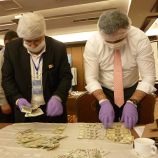 12 June 2018 - With a view to preventing and combating the abuse of money or value transfer services (MVTS) in West and Central Asia, UNODC, through its Regional Programme for Afghanistan and Neighbouring Countries, held an inter-regional training workshop last week in Beijing, China.
12 June 2018 - With a view to preventing and combating the abuse of money or value transfer services (MVTS) in West and Central Asia, UNODC, through its Regional Programme for Afghanistan and Neighbouring Countries, held an inter-regional training workshop last week in Beijing, China.
Speaking at the workshop, Jeremy Milsom, UNODC Senior Programme Coordinator, said: "Money or value transfer services are widely used by individuals, businesses, organisations, and even Governments to remit funds domestically and abroad. But unfortunately, these systems are also used for supplying resources for carrying out illegal activities."
During the five-day event, participants discussed a wide range of topics, including the illegal use and effective identification of MTVS; current threats; information sources; records and accounts kept by MTVS operators as evidence in support of court proceedings; and best practices in the collection, examination and recording of forensic exhibits.
Mock investigations and the study of practical cases were also part of the training as participants learned how to analyse financial documents, bank documents, cash declarations to identify discrepancies and anomalies.
The workshop provided an opportunity for participants to strengthen their capacities while raising awareness on the importance of cooperation at the regional and international level.
On that point, Jinghua Hao, Deputy Director General of the Anti-Money Laundering Bureau of the People's Bank of China, said: "This workshop aims at enhancing the ability to prevent, investigate and fight against money laundering and terrorist financing through MVTS. We have assisted UNODC in holding this workshop in Beijing several times".
On the margins of the workshop, representatives of financial intelligence units discussed effective cross border cooperation and the importance of signing memorandums of understanding to facilitate the exchange of suspicious transactions reports.
Funded by the European Union, the workshop was organized in cooperation with the Anti-Money Laundering Bureau of the People's Bank of China and supported by UNODC's Global Programme against Money-Laundering, Proceeds of Crime and the Financing of Terrorism (GPML).
UNODC's Regional Programme for Afghanistan and Neighbouring Countries